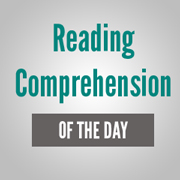
- Reading comprehension involves a proof reading of a passage of about 300 – 1000 words and answering the questions that follow.
- RC forms an important part of the verbal ability section. This section mainly focuses on to check the ability to understand the language and the underlying concept of the passage. The main focus should be to have a good command over the language as well as time management.
- Make sure you attempt these passage on a regular basis and with complete seriousness.
- Read the passage below and then answer the questions that follow.
- Once you are finished, click the ‘Get Results’ button below. Any items you have not completed will be marked incorrect.
There are three main groups of oils: animal, vegetable and mineral. Great quantities of animal oil come from whales, those enormous creatures of the sea, which are the largest of the animals remaining in the world. To protect the whales from the cold of the Arctic seas, nature has provided them with a thick covering off at, called blubber. When the whale is killed, the blubber is stripped off and boiled down. It produces a great quantity of oil which can be made into food for human consumption. A few other creatures yield oil, but none so much as the whale. The livers of the cod and halibut, two kinds of fish, yield nourishing oil. Both cod liver oil and halibut oil are given to sick children and other invalids who need certain vitamins. Vegetable oils has been known from very old times. No household can get on without it, for it is used in cooking. Perfumes may be made from the oils of certain flowers. Soaps are made from vegetable and animal product and the oils of certain flowers.
